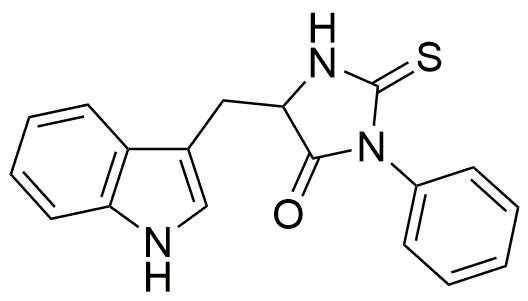Phenylthiohydantoin-tryptophan is widely utilized in research focused on:
- Protein Sequencing: This compound is essential in the Edman degradation method for sequencing proteins, allowing researchers to determine amino acid sequences accurately.
- Biochemical Assays: It serves as a reagent in various biochemical assays, facilitating the detection and quantification of proteins and peptides in complex mixtures.
- Drug Development: In pharmaceutical research, it aids in the design of new drugs by providing insights into protein interactions and stability, which is crucial for developing effective therapeutics.
- Diagnostic Applications: The compound is used in diagnostic tests to identify specific proteins related to diseases, helping in early detection and treatment strategies.
- Research on Tryptophan Metabolism: It plays a role in studies investigating tryptophan metabolism, which is important for understanding various physiological and psychological conditions.
Informations générales
Propriétés
Sécurité et réglementation
Applications
Phenylthiohydantoin-tryptophan is widely utilized in research focused on:
- Protein Sequencing: This compound is essential in the Edman degradation method for sequencing proteins, allowing researchers to determine amino acid sequences accurately.
- Biochemical Assays: It serves as a reagent in various biochemical assays, facilitating the detection and quantification of proteins and peptides in complex mixtures.
- Drug Development: In pharmaceutical research, it aids in the design of new drugs by providing insights into protein interactions and stability, which is crucial for developing effective therapeutics.
- Diagnostic Applications: The compound is used in diagnostic tests to identify specific proteins related to diseases, helping in early detection and treatment strategies.
- Research on Tryptophan Metabolism: It plays a role in studies investigating tryptophan metabolism, which is important for understanding various physiological and psychological conditions.
Documents
Fiches de données de sécurité (FDS)
La FDS fournit des informations de sécurité complètes sur la manipulation, le stockage et l’élimination du produit.
Spécifications du produit (PS)
Le PS fournit une description complète des propriétés du produit, notamment sa composition chimique, son état physique, sa pureté et les exigences de stockage. Il détaille également les plages de qualité acceptables et les applications prévues du produit.
Certificats d'analyse (COA)
Recherchez des certificats d'analyse (COA) en saisissant le numéro de lot du produit. Les numéros de lot et de lot se trouvent sur l'étiquette d'un produit, après les mots « Lot » ou « Lot de fabrication ».
Numéro de catalogue
Numéro de lot/série
Certificats d'origine (COO)
Ce certificat d'exploitation confirme le pays dans lequel le produit a été fabriqué, et détaille également les matériaux et composants utilisés et s'il est issu de sources naturelles, synthétiques ou autres sources spécifiques. Ce certificat peut être requis pour les douanes, le commerce et la conformité réglementaire.
Numéro de catalogue
Numéro de lot/série
Fiches de données de sécurité (FDS)
La FDS fournit des informations de sécurité complètes sur la manipulation, le stockage et l’élimination du produit.
DownloadSpécifications du produit (PS)
Le PS fournit une description complète des propriétés du produit, notamment sa composition chimique, son état physique, sa pureté et les exigences de stockage. Il détaille également les plages de qualité acceptables et les applications prévues du produit.
DownloadCertificats d'analyse (COA)
Recherchez des certificats d'analyse (COA) en saisissant le numéro de lot du produit. Les numéros de lot et de lot se trouvent sur l'étiquette d'un produit, après les mots « Lot » ou « Lot de fabrication ».
Numéro de catalogue
Numéro de lot/série
Certificats d'origine (COO)
Ce certificat d'exploitation confirme le pays dans lequel le produit a été fabriqué, et détaille également les matériaux et composants utilisés et s'il est issu de sources naturelles, synthétiques ou autres sources spécifiques. Ce certificat peut être requis pour les douanes, le commerce et la conformité réglementaire.


